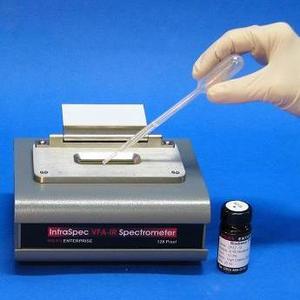Pending ASTM biodiesel blend method for filter-based IR analyzers

Photo: Wilks Enterprise Inc.
May 7, 2013
BY Wilks Enterprise Inc.
ASTM methods D7371 and EN 14078 for biodiesel blend analysis currently require FTIR spectrometers, but placing expensive equipment at a loading dock to ensure biodiesel blend accuracy is not a preferred choice of terminal operators. In addition to the cost associated with FTIR spectrometers, the level of technical knowledge required to operate them presents another issue. Wilks Enterprise has championed an ASTM method that provides a fast, easy-to-use and inexpensive infrared method for measuring FAME content in diesel fuel. This ASTM method is now in the process of full committee voting and should be approved and accepted before the end of 2013.
The InfraCal Biodiesel Blend Analyzer is a rugged, compact, specific-analysis fixed-filter infrared analyzer that is easy for fleet managers, distributors or regulators to use. It reads out directly in percent biodiesel and provides the user with the capability to measure the blend ratio on-site in 30 seconds. Its measurement range is zero to 100 percent with an accuracy of plus or minus 0.20 percent and can be operated by personnel having little or no knowledge of infrared analytical techniques.
The InfraSpec VFA-IR Spectrometer is a spectral range analyzer that contains a linear variable filter and a detector array covering the wavelength range of 5.4-10.8 μm (1850-925 cm-1). This provides the capability to not only measure biodiesel in diesel, but also ethanol in gasoline or water in ethanol. It is a compact, portable instrument with a simplified PC interface that provides nontechnical personnel with the ability to make measurements on-site at the blending terminal, as well as the manufacturing facility or laboratory.
Advertisement
While FTIR spectrometers have the capability to do much more than a simple biodiesel blend analysis, the InfraCal Biodiesel Blend Analyzer and InfraSpec VFA-IR Spectrometer are ideal workhorses that have been specifically designed for use in field environments and by nontechnical personnel.
Advertisement
Related Stories
Clean Fuels Alliance America on June 10 announced the launch of the newly redesigned BQ-9000 website, delivering a streamlined and user-friendly experience that better showcases the value of biodiesel quality assurance.
Montana Renewables LLC has delivered its first shipment of 7,000 gallons of SAF to Dearborn, Michigan's Buckeye Pipeline facility. From there, the fuel will be transported to the Detroit Metropolitan Airport via pipeline for use by Delta Air Lines.
NYC took a monumental step towards clean air and a sustainable future on Jan. 11 with the grand opening of the city's first retail fuel station dispensing renewable diesel. The project is a collaboration between Sprague and Sonomax.
The USDA on Jan. 11 awarded $19 million under the Higher Blend Infrastructure Incentive Program. The grants will support projects in 22 states to expand the availability of higher ethanol and biodiesel blends.
Jet Aviation partners with World Fuel Services to offer SAF in Bozeman, Montana, and Scottsdale, Arizona
Jet Aviation announced on Dec. 22 that it has signed an agreement with World Fuel Services to secure and offer sustainable aviation fuel (SAF) on-site at its FBOs in Bozeman, Montana, and Scottsdale, Arizona, effective immediately.
Upcoming Events










